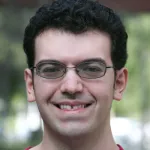
Born in Scotland, Dr. Euan Ashley graduated with 1st class Honors in Physiology and Medicine from the University of Glasgow. He completed medical residency and a PhD at the University of Oxford before moving to Stanford University where he trained in cardiology, joining the faculty in 2006. His group is focused on the science of precision medicine. He is best known for his work helping establish the field of medical genomics. His team developed some of the earliest tools for the interpretation of the human genome in the context of human health. He founded the Clinical Genomics Program and the Center for Inherited Cardiovascular Disease at Stanford. He was the first co-chair of the steering committee of the national Undiagnosed Diseases Network. He was a recipient of the National Innovation Award from the American Heart Association and the NIH Director’s New Innovator Award. He was recognized by the Obama White House for his contributions to Personalized Medicine. In 2018, he was awarded the American Heart Association Medal of Honor for Genomic and Precision Medicine. He was appointed Stanford Associate Dean in 2019 and became the inaugural holder of the Roger and Joelle Burnell Chair in Genomics and Precision Health in 2021. In 2023, he became a Fellow of the John Simon Guggenheim Memorial Foundation. He is co-founder of several companies including Personalis, Deepcell, and Svexa. His first book The Genome Odyssey - Medical Mysteries and the Incredible Quest to Solve Them was released in 2021. Father to three Americans, in his spare time, he pilots planes, tries to understand American football, plays jazz saxophone, and conducts research on the health benefits of single malt Scotch whisky.
The Ashley lab is focused on the application of genomics to medicine. They develop methods for the interpretation of whole genome sequencing data to improve diagnosis of genetic disease and to personalize the practice of medicine. They love big data questions and are obsessed with systems approaches to biology especially analysis of network graphs. The wet bench is where we test causality of key genes and investigate the biology of network modules. It is also the focus of our translational efforts. Therapeutic development is a near term goal and several of their discoveries are the focus of patents or are being actively pursued by pharmaceutical and biotechnology partners.















